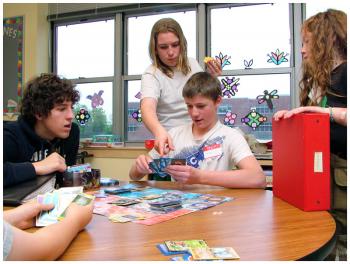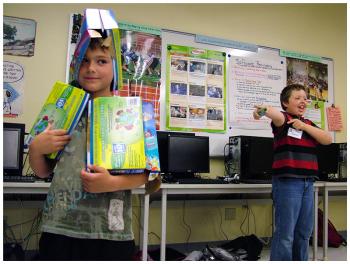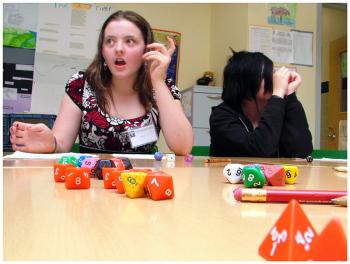Belfast's Game Loft goes mobile

THORNDIKE - Imaginary pets and fantasy warfare aren't explicitly addressed in the rules of Regional School Unit 3, and role playing probably falls under the broad category of “acting out.” But since last fall students at The Mount View School in Thorndike, have been encouraged to eviscerate trolls and trade legendary beasts with impunity — and diplomatic immunity — under the umbrella of a weekly program hosted by the Belfast-based Game Loft.
Patricia and Ray Estabrook founded The Game Loft in 1998 as a kind of clubhouse annex to their downtown retail shop All About Games. In the intervening years, they refined it into a youth development program based around the deceptively simple conceit of non-electronic game playing, which carries implicit lessons, and can be a vehicle for teaching a wide range of life skills.
The program itself was successful with youth in Belfast that beginning around five years ago, the Estabrooks started talking about expanding it to Western Waldo County.
“One of the points of the Game Loft has always been to reduce isolation: technological isolation — kids being too immersed in technology — and social isolation,” said Patricia Estabrook. “We run an after school program so kids won’t be stuck at home.”
In Western Waldo County, she said, where the population is comparatively poor, geographically scattered and fewer services exist the issue of youth isolation is especially bad.
The satellite program got a tentative start In early 2010 when Game Loft began hosting weekly events at the Unity College Center for the Performing Arts. The idea was well received, but the sessions were lightly attended, in part because students needed a way to get to and from UCCPA.
The program’s big break came last fall when RSU 3 switched to a single bus run system. The new schedule created a two hour block of time after school between early and late bus runs. The district invited the Game Loft to move the program into the Mount View School.
Bringing the program to the students had obvious benefits in terms of participation, but Ray Estabrook said he initially had reservations about partnering with the public school system, which he saw as treating students like something between product and prisoner.
“We have our own set of rules and we wanted to know that a principal or a teacher couldn't swoop in and take disciplinary action,” he said. If the program was going to work, it would need complete autonomy. After some negotiations the district offered the Game Loft a wing of the Middle School every Wednesday afternoon from 3:30 to 5:30 p.m.
“After that, what could we say,” Estabrook said. “We said we’d give it a try.”
By the spring, the program was averaging from 45 to 55 students per session and had hosted as many as 75.
On May 29, there were 59 students, ranging from grades 3 through 12. The action generally fell into three categories; board games, trading card games, and role-playing games.
“Board games” is a catch-all term for games that can be learned and enjoyed in one sitting. In the pedagogical scheme underlying the Game Loft’s programming, these teach basic rules of engagement — how to take turns, how to win and lose graciously.
Card-based trading games like Pokemon, and its edgier cousin Yu-Gi-Oh, attract the most students despite requiring a larger investment of time and often money. They are also the most social. Ray Estabrook described the Pokemon as “a bridge club for 8-year-olds.”
Magic, the third trading card game offered at Mount View, suits students with a mind for math, he said.
The list of second-line benefits goes on. On the surface it’s all play, but there’s a thread of social work and education running through everything the Game Loft does.
At the most basic level, the program offers a safe social environment to teens who aren’t drawn to sports or other clubs. Members get the benefits of being part of a community of peers with similar interests. Longtime members often go on to become mentors to younger members. Game Loft members also do a fair amount of community service outside the Loft.
The satellite program puts all of these pieces together.
On recent Wednesday, a dozen youth volunteers and several adults piled into vans outside the Belfast headquarters with an odd assortment of portable luggage — a plastic briefcase, a flight attendant’s rolling luggage, a toolbox — that would serve as a kind of mobile Game Loft.
When they got to Thorndike, they would only have a limited time to set up, play and break down, so everything had to be on schedule. And it had to be good.
“We need to pack a full Game Loft experience for these kids into two hours,” Ray Estabrook said on the way to the school. He didn’t want the Mount View group to feel like “the poor cousin” to the Belfast program.
In preparation he shot several questions to the two youth volunteers in the back seat of his car, Patrick Martell and Jesse Perry, who had been leading the Pokemon group. What worked last week? What didn’t work? How are you going to change it?
Martell and Perry were quick to answer. Some of the young players had made ill-advised trades. Some moms were unhappy. They were going to work on fair play and smarter trades.
Estabrook reminded them that Pokemon players tended to be a calmer, quieter bunch. "Let them come to you," he said.
Later that day, Stephen Colby, a senior at Belfast Area High School and veteran of the Game Loft program led a small group of middle school students through a series of maulings, ambushes, misfires and small victories along the blind courses of Pathfinder, a role playing game akin to Dungeons & Dragons.
After an hour, Colby turned over the job of Game Manager for the next session to Tyler Cross, a tenth grade student at Mount View High School who would be guiding a group of younger players.
The role playing games tend to attract natural leaders and Ray Estabrook said the incoming group particularly embodied that idea. First in the room were Sam St. Onge and Jacob Callas, a pair of sixth grade boys, who were fairly bouncing in anticipation.
Both claimed some experience with role playing games before the Game Loft brought its satellite program to the school this year, but that this had either required playing the games online or traveling to Belfast to go to the Game Loft.
Callas described his character as “a girl with wings,” who had been captured by a cannibal at the last session. St. Onge’s character was a “somewhat evil-like cat folk.”
Asked why he chose that character, he said, “I always wanted to be a cat.”
Same question to Callas.
“I like flying,” he said.
Where they will take the program, and their imaginations, next is up to the volunteers, students and the Estabrooks who appear to have no trouble with thinking outside the box.
Next year there has been talk of incorporating the Game Loft's Eureka Program, a role playing game designed by the Estabrooks, into the school curriculum. The games would be set during the Revolutionary War and the Civil War. Belfast residents may remember another iteration of the Eureka Program in which Game Loft members played out the closing chapter of a session on the domestic conflicts surrounding Vietnam War in the 1960s in a daylong piece of street theater in 2010.
“Young people role play of these historical periods and how Mainers reacted to the developments in the external world during these two periods," said Patricia Estabrook. "So they’ll interact with real history but in the context of imaginary geography and imaginary characters.”
Ethan Andrews can be reached at news@penbaypilot.com































